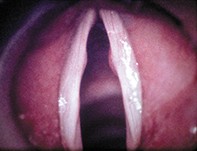Peer Reviewed
Feature Article Ear, nose and throat medicine
A practical approach to managing hoarseness
Abstract
The voice is one of the unique characteristics of human beings and is of vital importance in communication. Management of patients complaining of hoarseness is the responsibility of a team comprising GPs, laryngologists and speech therapists.
Key Points
- Hoarseness can be caused by systemic or local disease. A thorough history is essential to assess the significance of the symptom and will, in most cases, lead to a diagnosis.
- It is vital to find out how long hoarseness has been present. Any patient who has been hoarse for longer than four weeks needs a specialist assessment by a laryngologist to exclude carcinoma.
- Most patients with hoarseness are generally suffering from benign disease such as an acute upper respiratory tract infection. They can be treated with appropriate antibiotics, voice rest, inhalations of menthol and eucalyptus, and adequate hydration.
- Every attempt should be made to improve the health of the upper respiratory tract by controlling sinus disease and any gastro-oesophageal reflux. The proton pump inhibitor has been a giant leap forward in the treatment of laryngeal disorders secondary to oesophageal reflux.
- GPs may need to consider modifying the management of conditions such as hypertension, respiratory allergy or osteoporosis if medications are contributing to intolerable vocal symptoms.
Purchase the PDF version of this article
Already a subscriber? Login here.

